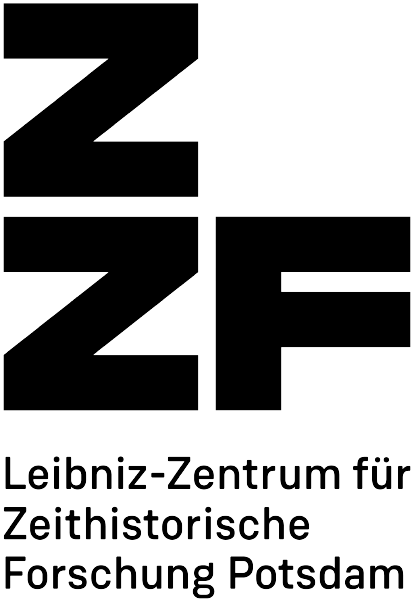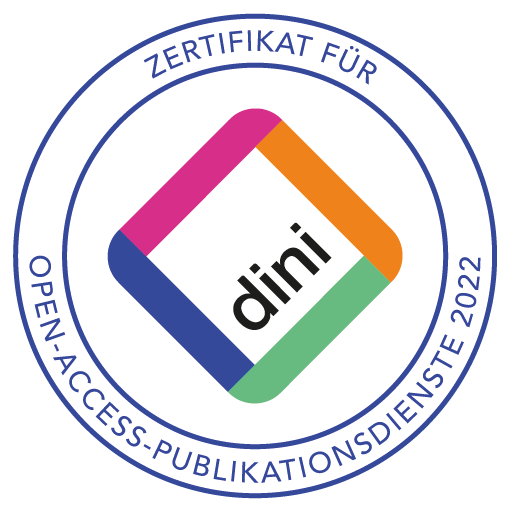Help
Miscellaneous
Answers
- About this server
-
The Leibniz Centre for Contemporary History Potsdam (ZZF) operates this document and publication server to provide academic publications in open access. The ZZF follows its Open Access Policy based on the Open Access Policy of the Leibniz Association and the Berlin Declaration on Open Access to Scholarly Knowledge. The server is part of various open access portals and publication platforms that are brought together at the ZZF under the umbrella of Zeitgeschichte digital - all carefully edited by editorial teams. Established open access platforms such as Docupedia-Zeitgeschichte, zeitgeschichte | online, Visual History or the journal Studies in Contemporary History support academic authors in all steps of publishing: from finding a topic, submission and review to proofreading and finally publication on different channels and in a wide variety of formats.
On this server – the central open access repository of the ZZF — Works and documents are published that are of relevance to contemporary historical research and that have already undergone an editorial review. The most important goal of the server is to make more quality-assured historical research literature available in open access. The publication service is available free of charge to all employees, fellows, doctoral students and alumni of the Leibniz Centre for Contemporary History.
Contents
The following types of documents can be archived and made available on this server:
- Articles from journals and edited collections
- Contributions in working papers, working paper series, unpublished lectures (gray literature) after editorial processing
- Monographs and anthologies
Authors can upload works themselves using the upload form. Before publication, a content and technical review is carried out by employees of the ZZF's "Zeitgeschichte digital" team. In addition, a written agreement on usage rights between the authors and/or Contributors and the Clio-online e.V. association (see below) and the ZZF has to be signed. All full texts should be submitted exclusively in PDF format.
The server primarily follows the so-called “green path” of Open Access and serves as a secondary publication venue for already quality-tested literature. The current focus of publications is on older print publications that have been retro-digitalized and are thus newly published as digital publications, such as the volumes of Zeithistorische Studien of the ZZF. At the same time, current publications from other series of publications will also be published at some timely distance from their appearance in print format of the ZZF. These include the series Geschichte der Gegenwart and Medien und Gesellschaftswandel im 20. Jahrhundert.
Another large part of the publications on this server are archived versions of articles from the above-mentioned ZZF online portals. The document and publication server also holds essays and book chapters that were only published as additional material in the online version of Contemporary History Research. These texts are linked via URL, but due to legal restrictions, they are only published on the primary journal website Studies in Contemporary History.
All publications are provided with cover pages, citation information, metadata and abstracts wherever possible. In any case, they contain information about the license or the terms of use of the document. In order to ensure permanent access, clear referencing and citation, each full-text document is assigned a Digital Object Identifier (DOI) — comparable to an electronic ISBN or ISSN - assigned. The DOIs are assigned via the registration agency DataCite in collaboration with Göttingen State and University Library.
Help
The Leibniz Center for Contemporary Historical Research Potsdam supports academic authors and editors in the open access publication of research results in a variety of ways. The publications department (Dr. Katja Stopka), the library team (Helen Thein-Peitsch, Marco Schein, Judith Berthold), the editors of the various Publication platforms (Christine Bartlitz, Dr. Annette Schuhmann, Dr. Jan-Holger Kirsch) as well as the Open Access coordinator (Karsten Borgmann). General inquiries can also be sent to the central address of these work areas: redaktion@zeitgeschichte-digital.de.
Technical notes on the publication process
You can upload documents to this server for publication. Registration is not necessary. To do this, use the upload form, which you can create by clicking on Publish in the menu bar reach.
You will first be asked to select a document type. Directly below you can upload your document(s). Then click on “Submit”. This is then followed by the actual input form for bibliographic information. Here, describe the document you want to include using the categories provided. Depending on the document type, some of the fields are mandatory and must therefore be filled out by you. Otherwise, provide as precise information as possible:- Document type (to be selected from a list)
- the title of your publication
- Short description of the content of your document
- Date the document is published (usually the day you post it)
- the language of the document (to be selected from a list)
- the license under which you want to publish your document (select from a list)
- Suggestions for the content classification of the document
If you don't know what to enter in a form field, please move the cursor over the input field. An explanatory help text is displayed (tooltip).
At the end of the data collection, your entries will be displayed again and you have two options: If necessary, you can correct the entries for your document or save them directly.
Content Classification
The content of published documents is structured using a local (scholarly) and a comprehensive classification system. All documents are classified using consistent thematic, regional and chronological categories. This local ordering system is applied to all contributions on portals within the framework of Zeitgeschichte digital. The employees of the ZZF library also index the documents according to the Dewey Decimal Classification (DDC).
All metadata of this server is to be considered as public domain (CC0 license) can be used freely without restrictions via the OAI-PMH web interface of the server. To further increase the visibility of the full texts on the Internet, the metadata will be sent to the open access catalog of the Leibniz Association LeibnizOpen as well as to OAI service providers such as the Bielefeld Academic Search Engine (BASE). Works are also a referenced in the joint association catalog GVK.
Availability
Publications on this server should be available for a long time. All documents marked as Open Access on this server are archived as Network publications at the German National Library. This means that once texts have been published, they cannot be easily deleted again. At the urgent request of the authors or rights holders and if there are important legal reasons, access to the full text will be deactivated by the editorial team, but the corresponding metadata record remains accessible via the DOI and the data record is amended with a note on the removed document. Publications that have been revised compared to previous ones and have undergone significant changes in content are marked as new versions. The ZZF and Clio-online e.V. (see below) guarantee that the full texts posted on this server will be archived as long as possible, but at least for five years. All published documents are saved in the open document format PDF/A, which is widely used for archiving purposes.
Technical operation of the server plattform
The availability of the published documents is ensured by the technical platform of the publication server. The ZZF operates its own servers in secure rooms that are regularly maintained. The software Opus4 currently developed by the Cooperative Library Association Berlin-Brandenburg is always continuously updated. The ZZF ensures technical support for the publication server on all working days and ensures that the application system is restored as quickly as possible in the event of system failures.
The technical operating concept for all server offerings managed by ZZF provides for regular offline backups, continuous updates and protection against physical and virtual attacks. The ZZF has decided to host the system locally in order to make it easier to make small adjustments to software and document types. Among other things, an interface was set up for the portal LeibnizOpen.
In addition, the ZZF ensures regular storage and backup routines to secure the stored data.
- A process of incremental (daily), cumulative (weekly) and full (monthly) data backups is used.
- The data is additionally backed up on magnetic tapes, which are stored in a specially secured room outside the building complex in which the server is located.
Legal aspects
The legal basis for publications on this server is provided by either general legal copyright conditions or explicit contractual agreements with the authors or publishers. Users of this server can choose between different license agreements that either allow further use (re-publication) of the text without consulting the authors and the ZZF or require consent. Private, non-commercial use of all texts published on this server is possible without asking.
It is the responsibility of those who submit documents for publication to ensure that the open access provision on this server does not violate the rights of third parties (in particular copyright or usage rights). Information on how international publishers deal with the right of secondary publication can be found, among others, on the SHERPA RoMEO List (English): Publisher copyright policies & self-archiving. Making a publication available on this server does not inhibit the author from further publishing the publication in print media or on other document servers (no exclusive transfer of usage rights).
Authors are recommended to use Creative Commons licenses. By choosing your CC license during the publication process, you decide simply and yet legally binding for everyone the conditions under which the public may use and reuse your publication. To determine the CC licenses, you must still have the relevant rights. You must check in advance whether you have assigned exclusive rights to a publisher, for example. The contact persons mentioned above will be happy to advise you when selecting a license. A subsequent change/restriction of the CC license once granted is not possible.

Source: E-Learning Arbeitsgruppe der TU Darmstadt, License: CC BY-SA 3.0 DE
Usage agreements with Clio-online e.V.
As part of a publication on this server, a simple right of use is transferred to the organization Clio-online – Historical information system e.V. This association was founded in November 2007 at the Humboldt University of Berlin and has its office there. The non-profit association is also the official operator of several ZZF online services, including Zeitgeschichte online, Studies in Contemporary History, Docupedia and Visual History, as well as being responsible for the operation of the historical scholarly information service H-Soz-Kult. It sees itself as a supporting association with which cooperative projects in the area of historical online information services and academic information infrastructures receive a long-term legal framework. As a private corporation, it offers additional legal protection for the projects operated by the association and the usage and copyright rights of all authors of the platforms.
The transfer of the non-exclusive right of use to Clio-online e.V. allows institutional members of the association, such as the ZZF, to save the full text and make it available to the public for online use (viewing, downloading and printing) and to convert it into other data formats for the purpose of long-term archiving.
Usage statistics
The accesses and downloads from this server are recorded using the analysis tool Matomo. There are filters that prevent automated access by bots etc. filter out. “User sessions” are counted, i.e. interactions by a user within a period of time (30 min). They are published in the ZZF annual reports. Detailed data protection information can be found in the Data protection regulations.

